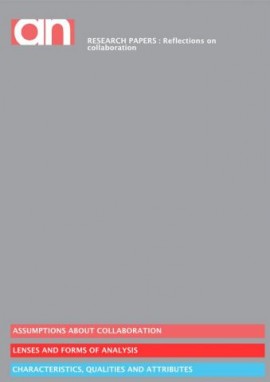
Reflections on collaboration
Chris Fremantle highlights key themes and issues around collaboration making use of a-n’s extensive archive of texts on the subject.
Chris Fremantle highlights key themes and issues around collaboration making use of a-n’s extensive archive of texts on the subject.
This Research paper forms part of a series that looks specifically at the nature and value of openly-advertised work and opportunities for visual and applied artists. Drawing on data published on www.a-n.co.uk/jobs, this series set out in 2007 to track […]
This Research paper forms part of a series that looks specifically at the nature and value of openly-advertised work and opportunities for visual and applied artists. Drawing on data published on www.a-n.co.uk/jobs_and_opps, this series set out in 2007 to track on an ongoing basis the key categories of awards/fellowships, academic posts, art vacancies, commissions, exhibitions, residencies and competitions/prizes, and by doing so, to identify any trends arising, and provide commentary and contextual evidence and analysis from other related sources, to contribute to arts and cultural consultations and policy.
Reyahn King explores the role of galleries within professional development for visual artists. PDF file [150kbs]
Reyahn King explores the role of galleries within professional development for visual artists. In the current climate, how can professional development for visual artists be continued and improved? This paper suggests that one answer lies in the relationship between publicly-funded regional galleries and visual artists becoming wider, deeper, and more strongly valued.
PDF version of Dany Louise’ report revealing that shockingly few individual artists apply forfunding in their own right, and even fewer are successful. [200kbs]
‘Ladders for development’ argues that the visual arts sector should pull together and support small visual arts organisations cut by Arts Council England because they “punch above their weight” and provide vital development of future artists. Six months on, Dany Louise interviews these […]
‘Ladders for development’ argues that the visual arts sector should pull together and support small visual arts organisations cut by Arts Council England because they “punch above their weight” and provide vital development of future artists. Six months on, Dany Louise interviews these arts organisations again, to find out how they’ve fared and what their futures hold.
Over the past five years, the words Turning Point have been read, heard, written and spoken with increasing frequency by people in the visual arts in England, but for many individual arts practitioners, in particular, the origins and activities of Turning Point remain a bit opaque. This briefing paper is for them and for anyone interested in understanding more about what Turning Point is and does.
The key finding of this study reveals that shockingly few individual artists apply for funding in their own right, and even fewer are successful. What this means is that there is little direct funding being given to artists to pursue and develop their own projects, under their own control – under 20% of available funding for the visual arts in England, 14% for Northern Ireland and around 18% for Scotland and Wales in 2009-2010.
New evidence exposing, quantifying and discussing the likely impact on the visual arts of Arts Council England’s decisions on fifteen previously Regularly Funded Organisations (RFOs) visual arts organisations unsuccessful in their NPO application. PDF file [200kbs]
New evidence exposing, quantifying and discussing the likely impact on the visual arts of Arts Council England’s decisions on fifteen previously Regularly Funded Organisations (RFOs) visual arts organisations unsuccessful in their NPO application. It shows that a disproportionate number of artists’ membership and development agencies and practice-based organisations lost core funding, despite ACE’s aim of creating a balanced national portfolio and makes recommendations for sustaining their work as part of a strengthened arts ecology.
When the economic recession hit, it impacted on everything. But how in particular did it affect the livelihoods of artists in terms of access to employment and career opportunities, and what is the longer-term impact? [PDF version 153 kb]
Explores the affect of the economic recession on the livelihoods of artists in terms of access to employment and career opportunities and raises concerns about how artists’ practice is likely to fare in this period of arts austerity. [HTML format]
Set up in 2006, the New International School’s peer-network of fifty members organise events, publications and collaborative works in Finland, France, Serbia, the Netherlands and the UK.
The Parallel School of Art engages in collaborative workshops and projects that explore and redefine models of learning.
Emerging from the self-organised culture of the Los Angeles art scene, The Public School is a peer-led education model.
The Islington Mill Art Academy was set up by students for students. It is an unaccredited, collectively run higher education experience.
The Hedgeschoolproject is a participatory work by Glenn Loughran that combines art, architecture and activism to explore forms of critical pedagogy and emancipatory learning.
Set up in 2008 for the New Dark Age exhibition, Free School is a non-hierarchical, collectivist, no-cost, peer-led art school.
Elements MA is an unfolding proposition for a educational pathway based around a titular masters course. Initially the MA will manifest itself through a series of events, exhibitions and activities from its base at Trade, Nottingham.
Department 21 is a school within a school where designers, artists and architects can meet, collaborate and share working space beyond the institutional boundaries of their own disciplines.
Terry Smith discusses the Experimental Art School.
Robyn Minogue reports from the ‘For a New Europe: University Struggles Against Austerity’ conference in Paris that looked to discuss and organise a common network based on European -wide issues including autonomous knowledge production, self-education and networking.
Martin Patrick on Robert Filliou and George Brecht’s collaborative shop project La Cédille qui sourit.


















